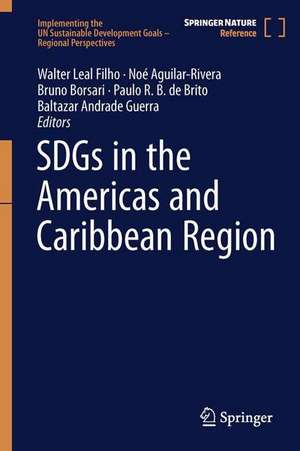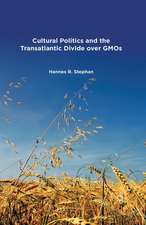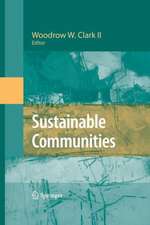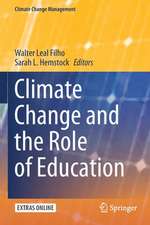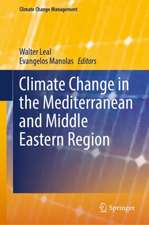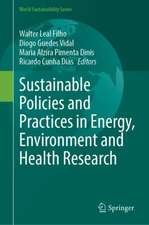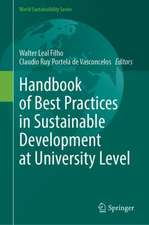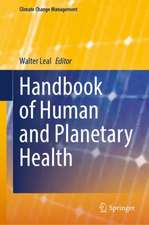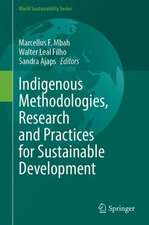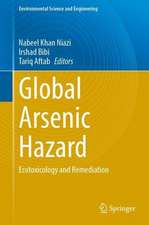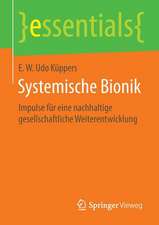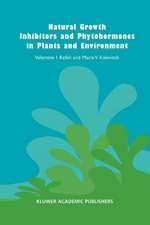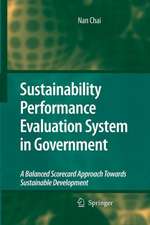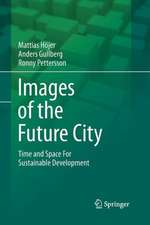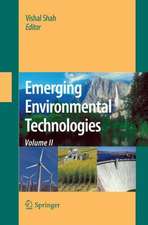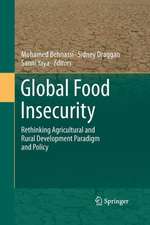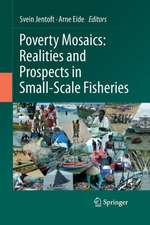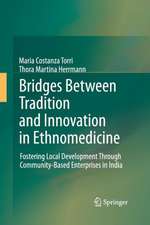SDGs in the Americas and Caribbean Region: Implementing the UN Sustainable Development Goals – Regional Perspectives
Editat de Walter Leal Filho, Noé Aguilar-Rivera, Bruno Borsari, Paulo R. B. de Brito, Baltazar Andrade Guerraen Limba Engleză Hardback – sep 2023
This volume provides an overview of the ways sustainable development issues as a whole, and the SDGs in particular, are perceived and practiced in a variety of countries in the Latin America and Caribbean region. It also discusses the extent to which its many socio-economic problems hinder progresses towards the pursuit of a sustainable future, and documents successful experiences from across the region.
This book is part of the "100 papers to accelerate the implementation of the UN Sustainable Development Goals initiative".
Preț: 3243.12 lei
Preț vechi: 4267.27 lei
-24% Nou
Puncte Express: 4865
Preț estimativ în valută:
620.58€ • 649.25$ • 515.51£
620.58€ • 649.25$ • 515.51£
Carte tipărită la comandă
Livrare economică 29 martie-04 aprilie
Preluare comenzi: 021 569.72.76
Specificații
ISBN-13: 9783031160165
ISBN-10: 3031160169
Pagini: 1686
Ilustrații: XXXVIII, 1686 p. 190 illus., 160 illus. in color. In 2 volumes, not available separately.
Dimensiuni: 155 x 235 mm
Greutate: 3.65 kg
Ediția:1st ed. 2023
Editura: Springer International Publishing
Colecția Springer
Seria Implementing the UN Sustainable Development Goals – Regional Perspectives
Locul publicării:Cham, Switzerland
ISBN-10: 3031160169
Pagini: 1686
Ilustrații: XXXVIII, 1686 p. 190 illus., 160 illus. in color. In 2 volumes, not available separately.
Dimensiuni: 155 x 235 mm
Greutate: 3.65 kg
Ediția:1st ed. 2023
Editura: Springer International Publishing
Colecția Springer
Seria Implementing the UN Sustainable Development Goals – Regional Perspectives
Locul publicării:Cham, Switzerland
Cuprins
Alternative Systems for Water Security in the Brazilian Semiarid Region.- Social Governance of the 2030 Agenda and the SDGs in Brazil.- Perspectives for Resilience, Social Inclusion, and Sustainable Tourism in Mexico.- Analysis of Supply Chain Sustainability and Resilience.- Amazon 4.0: Ways to Sustainable Development.- Sustainability Approach at the Chilean Constituent Assembly.- Mining Industry and the Sustainable Development Goals in Brazil’s Amazon.- Reverse Logistics for Post-Consumer Waste in Brazil: SDGs 11 and 12 for 2030.- Impact of Land Use Cover Change (LUCC) on Floods: Acapulco de Juárez Bay, Mexico.- Implementing the SDGs Through Community Rural Tourism in Central Mexico: COVID-19 Pandemic.- Environmental Impact and Food Security: Socio-Ecological Sustainability of Soya from Brazil.- Efforts Towards Ending Child Labor: Case of Brazil.- Pathways to a Sustainable Blue Economy in Latin America and the Caribbean.- SDGs and Latin American University: Impact of Scientific Knowledge Production in Policy Documents.- COVID-19 and Its Influence on Sustainable Development Goal 4: Latin America and Caribbean Region.- Community Interactive Social Projects to Achieving Sustainable Development Goals: Yucatan’s Rural Areas, Mexico.- Gender Equity for Sustainable Development: Barriers and Telehealth Opportunities During the Pandemic.- Agroecology as Catalyst for Smallholder Farming Mitigation and Adaptation to Climate Change: Caribbean Region.- Urban Mobility and Increase in Greenhouse Gas Emissions in Mexican Cities.- Well-Being at Work and Sustainability in Public Services: Brazilian University Case.- Sustainability and Development at Northwestern Municipalities in Mexico: Chihuahua Region...
Notă biografică
Professor Walter Leal Filho (BSc, PhD, DSc, DPhil, DTech, DL, DLitt, FSB, FLS, FRGS) holds the Chairs of Climate Change Management at the Hamburg University of Applied Sciences (Germany), and Environment and Technology at Manchester Metropolitan University (UK). He directs the European School of Sustainability Science and Research (ESSSR) and the Inter-University Sustainable Development Research Programme, the largest network of universities specifically focusing on research on matters related to sustainable develpment. Professor Walter Leal Filho has over 30 years experience on sustainable development research and in excess of 700 publications to his credit.
Professor Noé Aguilar-Rivera (BSc MSc PhD) holds the chairs of research and thesis seminar, sustainable development, the Sustainable Development Goals (SDGs), agroecological and organic agriculture at the Faculty of Biological and Agricultural Sciences of Veracruzana University, México. BSc, MSc and PhD supervisor specifically focusing on research on matters related to sustainability, bioeconomy and competitiveness. He has over 20 years of experience on sustainable development, waste valorization, and environmental management in agribusiness research and in excess of 150 publications to his credit. Experienced reviewer, as well as editor in indexed journals and books.
Dr. Bruno Borsari (D.Ag.Sc., PhD) is Professor Emeritus in the Biology Department at Winona State University in Minnesota, USA and adjunct faculty member at Minnesota State College Southeast where he teaches agroecology and environmental science courses in the Sustainable Food & Farming program. He was awarded two Fulbright Scholar grants between 2014 and 2020 that brought him to Panama to collaborate with local universities and introduce agroecology in their food and agricultural science curricula. Professor Bruno Borsari has over 30 years experience in sustainable development teaching, research andoutreach, substantiated by more than 100 publications.
Professor Paulo Borges de Brito (M.S. in Environmental Science, M.S. Agricultural and Resource Economics) is a Faculty Instructor in the Management Department at Colorado State University (CSU). He teaches Entrepreneurship, Social and Sustainable venturing, and International Business courses. Paulo was the founder of the Brazilian chapter of a conservation-focused non-profit which promotes collaborative conservation efforts worldwide. Brito has also organized and contributed articles to two award-winning books broaching the subject of social, economic, and environmental synergies for sustainable development. His current research focuses on the business opportunities created by the bioeconomy and social justice aspects globally. Brito received the CSU Alumni Association Best Teacher Award in 2023.
Professor José Baltazar Salgueirinho Osório de Andrade Guerra is Dean and full Professor in the Graduate Program in Administration at “Universidade do Sul de Santa Catarina” (Unisul, Brazil). He holds the Chairs of Sustainable Development and Global Environmental Change at the University of Southern Santa Catarina, Unisul, and Ânima Institute (Brazil). He is the Director and Founder of the Centre for Sustainable Development/Research Group in Energy Efficiency and Sustainability (Greens, Unisul) and Research Fellow at Cambridge Centre for Environment, Energy and Natural Resource Governance, University of Cambridge. Professor Baltazar has over 20 years of experience in sustainable development research and over 150 publications to his credit.
Professor Noé Aguilar-Rivera (BSc MSc PhD) holds the chairs of research and thesis seminar, sustainable development, the Sustainable Development Goals (SDGs), agroecological and organic agriculture at the Faculty of Biological and Agricultural Sciences of Veracruzana University, México. BSc, MSc and PhD supervisor specifically focusing on research on matters related to sustainability, bioeconomy and competitiveness. He has over 20 years of experience on sustainable development, waste valorization, and environmental management in agribusiness research and in excess of 150 publications to his credit. Experienced reviewer, as well as editor in indexed journals and books.
Dr. Bruno Borsari (D.Ag.Sc., PhD) is Professor Emeritus in the Biology Department at Winona State University in Minnesota, USA and adjunct faculty member at Minnesota State College Southeast where he teaches agroecology and environmental science courses in the Sustainable Food & Farming program. He was awarded two Fulbright Scholar grants between 2014 and 2020 that brought him to Panama to collaborate with local universities and introduce agroecology in their food and agricultural science curricula. Professor Bruno Borsari has over 30 years experience in sustainable development teaching, research andoutreach, substantiated by more than 100 publications.
Professor Paulo Borges de Brito (M.S. in Environmental Science, M.S. Agricultural and Resource Economics) is a Faculty Instructor in the Management Department at Colorado State University (CSU). He teaches Entrepreneurship, Social and Sustainable venturing, and International Business courses. Paulo was the founder of the Brazilian chapter of a conservation-focused non-profit which promotes collaborative conservation efforts worldwide. Brito has also organized and contributed articles to two award-winning books broaching the subject of social, economic, and environmental synergies for sustainable development. His current research focuses on the business opportunities created by the bioeconomy and social justice aspects globally. Brito received the CSU Alumni Association Best Teacher Award in 2023.
Professor José Baltazar Salgueirinho Osório de Andrade Guerra is Dean and full Professor in the Graduate Program in Administration at “Universidade do Sul de Santa Catarina” (Unisul, Brazil). He holds the Chairs of Sustainable Development and Global Environmental Change at the University of Southern Santa Catarina, Unisul, and Ânima Institute (Brazil). He is the Director and Founder of the Centre for Sustainable Development/Research Group in Energy Efficiency and Sustainability (Greens, Unisul) and Research Fellow at Cambridge Centre for Environment, Energy and Natural Resource Governance, University of Cambridge. Professor Baltazar has over 20 years of experience in sustainable development research and over 150 publications to his credit.
Caracteristici
Showcases how countries in the Americas and Caribbean Region handle and implement the UN SDGs Comprehensively describes research, projects and practical action Provides government agencies, education institutions and non-governmental agencies
